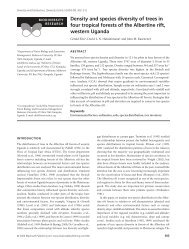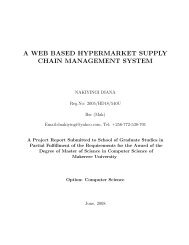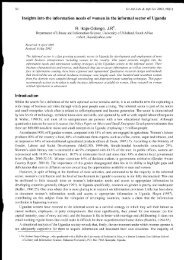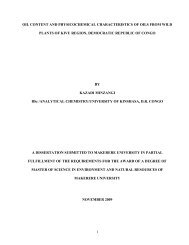THE UNIVERSITY OF LEIPZIG
THE UNIVERSITY OF LEIPZIG
THE UNIVERSITY OF LEIPZIG
You also want an ePaper? Increase the reach of your titles
YUMPU automatically turns print PDFs into web optimized ePapers that Google loves.
International Development (DFID) in 1998 redefined its approach to rural development as<br />
"sustainable rural livelihoods" based on the decentralised service delivery. 402<br />
All the above strategies indicate a positive move to link conservation to local resource usage<br />
within an existing institutional make-up. In both cases, decentralisation was preferred based<br />
on the fact that it was the best way to manage regional and district resources in Kakamega.<br />
We can perhaps argue that such strategies targeted increased institutional usage in form of<br />
local knowledge in the appreciation of biodiversity as well as enhancing resource users’ role<br />
in resource, institutional planning and framing, to achieve a two pronged approach: livelihood<br />
and conservation via local decentralisation.<br />
The interest in this kind of approach is derived from several quarters as illuminated by Reitsma<br />
et al. 403 It also obtains from studies emphasizing income diversification within the tropical<br />
forest belts, given the fact that many of the people in such areas use local natural resources to<br />
eke a living, without necessarily looking at the resource decline. 404 Subscribers to such<br />
schools of thought also view improving local governance and resource use structures as a way<br />
of reversing this spiral. However, we still need to add that such local innovations need to<br />
delve more into the local institutional matrices; otherwise they are bound to suffer from what<br />
we call elite capture. 405<br />
Decentralisation is the devolution of state assets and powers to local or private decisionmaking<br />
bodies, representative local government, local administrative branches of central<br />
government, non-state actors and organisations such as NGOs, co-operatives, associations,<br />
etc or private individuals and corporations. 406 When powers are delegated to local units of the<br />
state, the process is called deconcentration or in simple terms known as bringing government<br />
and its services closer to the population. Devolution to non-state bodies like NGOs or other<br />
private groups or individuals is called privatisation. 407 However, it is a form of enclosure<br />
when it involves the privatisation of community or public resources. Devolution to<br />
community and representative local government is usually called political decentralisation<br />
and can be a mechanism of community participation. 408<br />
402 Bryceson, D. F. 1999. African Rural Labour, Income Diversification and Livelihood Approaches: A long-<br />
term development perspective. Review of African Political Economy 80:171-89.<br />
403 Reitsma, H; T. Dietz and de Haan, L., eds. 1992. Coping with semi-aridity: How rural the Poor Survive in<br />
dry-season Environments. Amsterdam: University of Amsterdam.<br />
404 Davies, S. 1996. Adaptable Livelihoods. Coping with Food Insecurity in the Malian Sahel. Chichester: Wiley.<br />
Reardon, T., and Vosti, S. A. 1995. Links between rural poverty and the environment in developing<br />
countries: Asset categories and investment poverty. World Development 23:1495-1507.<br />
405 Ribot, J.C. 1993. Market-state relations and environmental policy: limits of state capacity in Senegal. In The<br />
State and Social Power in Global Environmental Politics, edited by Ronnie D. Lipschutz and Ken Conca,<br />
24-46. New York: Columbia University Press.<br />
406 O’Donnell, G. 1998. Horizontal Accountability in New Democracies. Journal of Democracy 9(3):112-126.<br />
407 Murombedzi, J. 1998. The Evolving Context of Community Based Natural Resource Management in Sub-<br />
Saharan Africa in Historical Perspective. Paper prepared for the International Workshop on Community<br />
Based Natural Resource Management, The World Bank, Washington, D.C. 10-14 May 1998.<br />
408 Porter,G and E. Young. 1998. Decentralized Environmental Management and Popular Participation in Coastal<br />
Ghana. Journal of International Development 10:515-526.<br />
84






